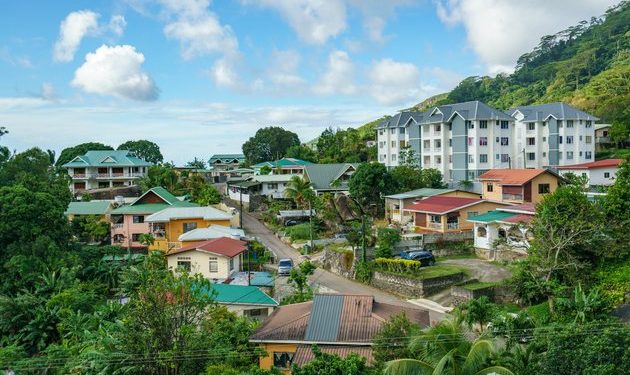THE CONVERSATION
The small archipelago nation of Seychelles, northeast of Madagascar in the Indian Ocean, has emerged as the world’s most vaccinated country for COVID-19.
Around 71% of people have had at least one dose of a COVID vaccine, and 62% have been fully vaccinated. Of these, 57% have received the Sinopharm vaccine, and 43% AstraZeneca.
Despite this, there has been a recent surge in cases, with 37% of new active cases and 20% of hospital cases being fully vaccinated. The country has had to reimpose some restrictions.
How can this be happening? There are several possible explanations:
the herd immunity threshold has not been reached – 62% vaccination is likely not adequate with the vaccines being used
herd immunity is unreachable due to inadequate efficacy of the two vaccines being used
variants that escape vaccine protection are dominant in Seychelles
the B1617 Indian variant is spreading, which appears to be more infectious than other variants
mass failures of the cold-chain logistics needed for transport and storage, which rendered the vaccines ineffective.
What does the country’s experience teach us about variants, vaccine efficacy and herd immunity?
Let’s break this down.
Variants can escape vaccine protection
There are reports of the South African B.1.351 variant circulating in Seychelles. This variant shows the greatest ability to escape vaccine protection of all COVID variants so far.
In South Africa, one study showed AstraZeneca has 0-10% efficacy against this variant, prompting the South African government to stop using that vaccine in February.
The efficacy of the Sinopharm vaccine against this variant is unknown, but lab studies show some reduction in protection, based on blood tests, but probably some protection.
However, no comprehensive surveillance exists in the country to know what proportion of cases are due to the South African variant.
The UK variant B117, which is more contagious than the original strain, became the dominant variant in the United States. But the US still achieved a dramatic reduction in COVID-19 cases through vaccination, with most people receiving the Pfizer and Moderna vaccines.
Israel, where the UK variant was dominant, also has a very high vaccination rate, having vaccinated nearly 60% of its population with Pfizer. It found 92% effectiveness against any infection including asymptomatic infection, and Israel has seen a large drop in new cases.
The United Kingdom has used a combination of Pfizer and AstraZeneca vaccines. More than 50% of the population have had a single dose and almost 30% are fully vaccinated. The country has also seen a significant decline in case numbers.
But there’s a current surge of cases in northwest England, with most new cases in the city of Bolton being the Indian variant. This variant is also causing outbreaks in Singapore, which had previously controlled the virus well.
Seychelles needs to conduct urgent genome sequencing and surveillance to see what contribution variants of concern are making, and whether the Indian variant is present.
If the South African variant is dominant, the country needs to use a vaccine that works well against it. Many companies are making boosters targeted to this variant, but for now, Pfizer would be an option. In Qatar, local researchers found Pfizer had 75% effectiveness against the South African variant.
We need to use high-efficacy vaccines to achieve herd immunity
The reported efficacy of Sinopharm is 79% and AstraZeneca is 62-70% from phase 3 clinical trials.
Our research at the Kirby Institute showed that, in New South Wales, Australia, using a vaccine with 90% efficacy against all infection means herd immunity could be achieved if 66% of the population was vaccinated.
However, using lower efficacy vaccines means more people need to be vaccinated. If the vaccine is 60% effective, the proportion needing to be vaccinated rises to 100%.
When you get an efficacy of less than 60%, herd immunity is not achievable.
However, these calculations were done for the regular COVID-19 caused by the D614G variant which dominated in 2020. This has a reproductive number (R0) of 2.5, meaning people infected with the virus on average infect 2.5 others.
But the B117 variant is 43-90% more contagious than D614G, so the R0 may be up to 4.75. This will require higher vaccination rates to control spread.
What’s more, the Indian variant B1617 has been estimated to be at least 50% more contagious than B117, which could take the R0 to over 7, and takes us into uncharted territory.
This could explain the catastrophic situation in India, but also raises the stakes for vaccination, as lower efficacy vaccines will not be able to contain such highly transmissible variants effectively.
Herd immunity is still possible, but depends on the efficacy of the vaccine used and the proportion of people vaccinated.
A UK modelling study found using very low efficacy vaccines would result in the economy barely breaking even over ten years because it would fail to control transmission. On the other hand, using very high efficacy vaccines would result in much better economic outcomes.
Vaccinating the world is the only way to end the pandemic
As the pandemic continues to worsen in some parts of the world, the risk increases of more dangerous mutations that are vaccine-resistant or too contagious to control with current vaccines.
Keeping up with mutations is like whack-a-mole while the pandemic is raging.
The take-home message for our pandemic exit strategy is that the sooner we get the whole world vaccinated, the sooner we will control emergence of new variants.
Read more: 3 ways to vaccinate the world and make sure everyone benefits, rich and poor
Author: C Raina MacIntyre – Professor of Global Biosecurity, NHMRC Principal Research Fellow, Head, Biosecurity Program, Kirby Institute, UNSW






